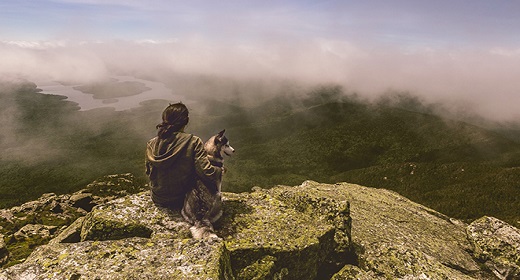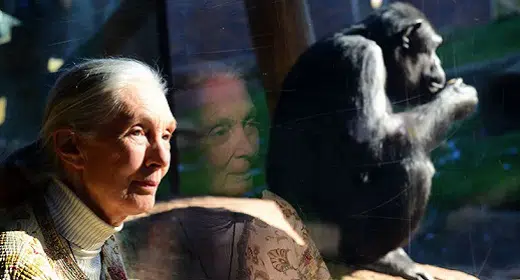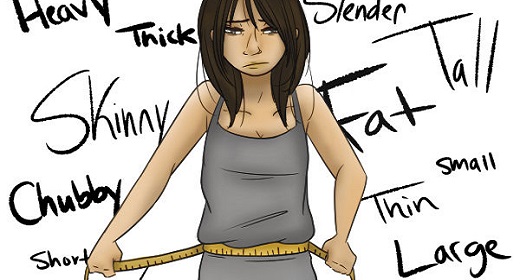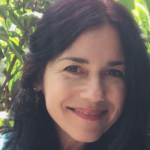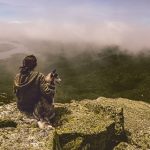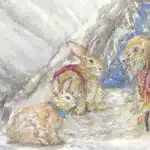by Sigal Samuel: The renowned primatologist wants us to remember that humans aren’t so exceptional — we’re animals, too…
When Jane Goodall was just 26 years old, she began trekking through the forests of Tanzania to study wild chimpanzees. At first they’d run away from her, but after months of patient interaction, she actually became accepted as a member of their community — the first researcher ever to win that distinction. She had no academic degree, and yet she was making pioneering discoveries. Chimps use tools! Chimps hunt and eat meat! Chimps have complex emotional lives, from loving parental bonds to brutal battles!
Her discoveries overturned the dominant paradigm of the day, which I can sum up in two words: human exceptionalism. It’s the idea that we humans are totally different from, and superior to, animals. Goodall has said that helping us to ditch this idea — to blur the line between humans and the rest of the animal kingdom — has been her greatest achievement in life.
So, now that the world-renowned primatologist is 87, I wanted to reflect on what the past 60 years of studying chimps has taught her — not about chimps, but about us humans. And I wanted to ask what we can do to help animals and the natural environment we all rely on.
I discussed these questions with Goodall on the Vox Conversations podcast in advance of the publication of her forthcoming book, The Book of Hope: A Survival Guide for Trying Times, out October 19.
Sigal Samuel
When you first started studying wild chimps in 1960, scientists knew almost nothing about their behavior. And yet they were very sure that a scientist should not talk about a chimp having a mind, personality, emotions — only humans had those. But you quickly discovered that’s just not true. What was your first clue that chimps are reasoning, feeling creatures like us?
Jane Goodall
Well, actually, I learned it long before I got to Gombe [in Tanzania] to study chimpanzees, because when I was a child I had a wonderful teacher and that was my dog, Rusty. You cannot share your life in a meaningful way with a dog, a cat, a rabbit, a rat, a bird, a horse, a pig, I don’t care, and not know that they have emotions similar to ours and that they have minds that can sometimes solve problems.
What you have to realize is that when I went to Gombe, I hadn’t been to college. I had absolutely no idea that scientists have this reductionist feeling about animals. So I went knowing that of course the chimpanzees, our closest living relatives, would have emotions, would have personalities, and would be highly intelligent.
The only research being done on chimpanzees at that time was in captivity. There was one wonderful book called The Mentality of Apes written by an Austrian psychologist about a colony of captive chimpanzees. He wrote this book and immediately all the other scientists pounced on him and said: “Well, these are captive chimpanzees, they’re only intelligent because our humanity has rubbed off on them!” I mean, how arrogant can you get?
Sigal Samuel
So it was actually helpful for you to be going into Gombe without having scientific training or an academic degree, because that enabled you to just see what you were seeing without those blinders having been put on you?
Jane Goodall
Yeah, absolutely.
Sigal Samuel
And contrary to the scientific practice of the day, you gave the chimps human names, like David Graybeard or Fifi. That was very taboo in the scientific community, where you were supposed to maintain this veneer of objective distance from research subjects. But I think you have never been shy about developing these loving connections with animals.
But as the years went on there, you did go on to observe some pretty serious violence between groups of chimps, and you’ve even referred to a war that broke out between these different groups. Do you think that at first you romanticized chimps and then had to move away from that view?
Jane Goodall
Yeah, it was a shock. I did think they were like us, but nicer.
The thing is that they’re highly territorial and the males will get together and patrol the boundaries of their territory. And if they spy an individual from a neighboring community, they’re likely to chase. It’s quite scary, actually.
Sigal Samuel
Given the two poles that you discovered — some very trusting behavior and bonds, and some aggression and violence — do you think of chimps as being capable of altruism or kindness on the one hand, and malice or evil on the other?
Jane Goodall
Not evil. I think only humans are capable of evil. Because to me, evil is not just responding to an aggressive impulse (which is what chimps do), but sitting deliberately in cold blood and planning the destruction of another human being or planning a war.
Just like them, we have a good side and a dark side. But I think our dark side is worse because we are capable of evil. I think our good side is better. Because while chimps can be altruistic, they’re responding to the immediate emotion. But we can be altruistic thinking about the consequences to ourselves and realizing that if we move ahead to help that person, it may have serious negative impacts on us, but doing it all the same because of this compassion we have.
Sigal Samuel
There was this fateful day when you observed a chimpanzee sticking a stalk of grass into a termite hole and then pulling out the stalk that was now covered in termites and eating them. You realized, “Hey, this is tool use!” When you later wrote to your mentor, Louis Leakey, about what you’d seen, he replied: “We must now redefine man, redefine tool, or accept chimpanzees as human.” Did you realize right when you were watching this tool use happening that this was something huge?
Jane Goodall
I’d read enough to know that Western science believed that only humans make tools. So I knew that this was a very important observation and I could hardly believe that I’d seen it, so I waited until I saw a couple more chimpanzees using tools, and it was only then that I wrote to Louis Leakey. The thing is that at the time we were defined as “Man the Toolmaker,” and that’s what caused Louis to write those famous words. And that was the turning point.
Sigal Samuel
As someone who recognized these human-like traits in nonhuman primates very early on, have you found that that either forces people to expand the circle of humanity, or shrink what they understand human nature to be?
Jane Goodall
I think it’s now generally accepted that we are not the only beings on the planet with personalities, minds, and emotions — that we are part of and not separated from the rest of the animal kingdom. And yet, when I first got to Cambridge and I’d been with the chimps one and a half years, I was actually told that the difference between us and all other animals was one of kind. We were on a pinnacle, separated from all the others by an unbridgeable chasm.
Sigal Samuel
Why do you think it was so taboo in your early years for scientists to anthropomorphize animals?
Jane Goodall
It’s still taboo now, actually. I think it was the long arm of religion reaching out. I mean, think of how Darwin was greeted when he got back after the voyage of the Beagle with his theory of evolution. Religion was up in arms immediately, and a lot of scientists believed in religion so they could not believe in evolution. We were different because we had a soul and they [animals] didn’t.
Sigal Samuel
Do you think humans also have had a tendency to dismiss certain species as unintelligent because we think that intelligence has to look the way it does in humans for it to count as intelligence?
Jane Goodall
Of course. That’s the whole premise of science, that we’re above the animals in all these different ways. But there are some ways that animals are highly intelligent in ways that we certainly would be completely stupid. And then we expect animals to respond to intelligence tests as though they’re people — but they’re not people, they’re animals, and they develop their intelligence to cope with the problems that they meet in the wild.

